一般现在时的特殊疑问句
一般现在时的特殊疑问句的结构
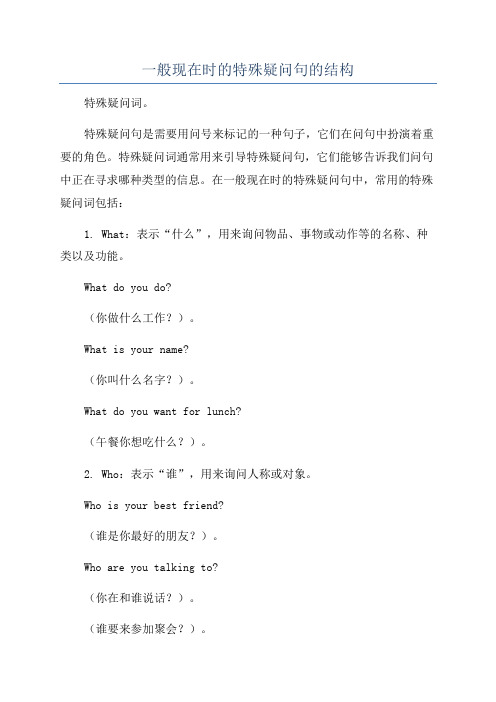
一般现在时的特殊疑问句的结构特殊疑问词。
特殊疑问句是需要用问号来标记的一种句子,它们在问句中扮演着重要的角色。
特殊疑问词通常用来引导特殊疑问句,它们能够告诉我们问句中正在寻求哪种类型的信息。
在一般现在时的特殊疑问句中,常用的特殊疑问词包括:1. What:表示“什么”,用来询问物品、事物或动作等的名称、种类以及功能。
What do you do?(你做什么工作?)。
What is your name?(你叫什么名字?)。
What do you want for lunch?(午餐你想吃什么?)。
2. Who:表示“谁”,用来询问人称或对象。
Who is your best friend?(谁是你最好的朋友?)。
Who are you talking to?(你在和谁说话?)。
(谁要来参加聚会?)。
3. Where:表示“哪里”,用来询问地方或位置。
Where is the library?(图书馆在哪里?)。
Where do you live?(你住在哪里?)。
Where did you go for your holidays?(你去哪里度假了?)。
4. When:表示“什么时候”,用来询问时间或事件发生的时间。
When do you have class?(你什么时候上课?)。
When did you wake up this morning?(你今天早上什么时候起床的?)。
When are you going to the airport?(你什么时候去机场?)。
5. Why:表示“为什么”,用来询问原因或理由。
Why did you leave your last job?(为什么你离开了上一个工作岗位?)。
Why do you like this book?(你为什么喜欢这本书?)。
Why don't you eat meat?(你为什么不吃肉?)。
注意事项。
1.在一般现在时的疑问句中,助动词为do,主语为第三人称单数时,应该使用does。
一般现在时特殊疑问句例句
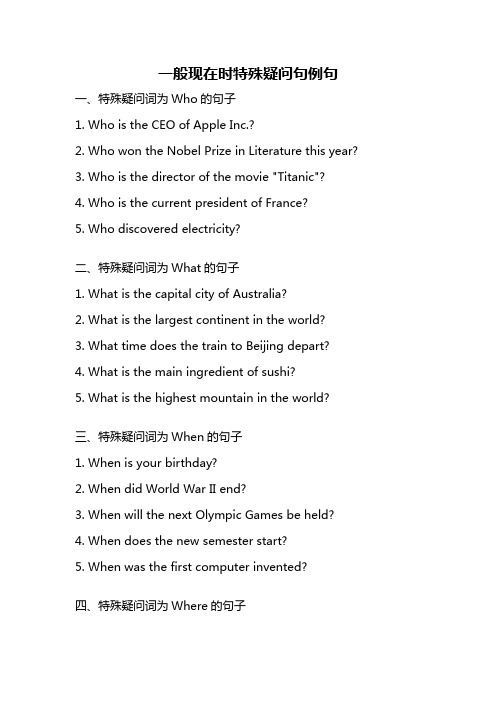
一般现在时特殊疑问句例句一、特殊疑问词为Who的句子1. Who is the CEO of Apple Inc.?2. Who won the Nobel Prize in Literature this year?3. Who is the director of the movie "Titanic"?4. Who is the current president of France?5. Who discovered electricity?二、特殊疑问词为What的句子1. What is the capital city of Australia?2. What is the largest continent in the world?3. What time does the train to Beijing depart?4. What is the main ingredient of sushi?5. What is the highest mountain in the world?三、特殊疑问词为When的句子1. When is your birthday?2. When did World War II end?3. When will the next Olympic Games be held?4. When does the new semester start?5. When was the first computer invented?四、特殊疑问词为Where的句子1. Where is the nearest post office?2. Where can I find a good restaurant around here?3. Where did you go on your last vacation?4. Where is the Eiffel Tower located?5. Where can I buy tickets for the concert?五、特殊疑问词为Why的句子1. Why did you choose to study abroad?2. Why is the sky blue?3. Why do birds fly south for the winter?4. Why did the company decide to close down?5. Why is it important to exercise regularly?六、特殊疑问词为How的句子1. How do you make a chocolate cake?2. How long does it take to get to the airport from here?3. How did you learn to speak English so fluently?4. How can I improve my writing skills?5. How does a microwave oven work?七、特殊疑问词为Which的句子1. Which is your favorite color?2. Which book are you currently reading?3. Which country won the World Cup last year?4. Which team won the Super Bowl this year?5. Which movie won the Best Picture at the Oscars?八、特殊疑问词为Whose的句子1. Whose car is parked in front of the house?2. Whose idea was it to go hiking this weekend?3. Whose phone is ringing?4. Whose dog is barking outside?5. Whose turn is it to do the dishes?九、特殊疑问词为How many的句子1. How many students are in your class?2. How many books have you read this year?3. How many languages can you speak?4. How many hours of sleep do you get each night?5. How many people attended the concert last night?十、特殊疑问词为How much的句子1. How much does a ticket to the concert cost?2. How much money do you have in your wallet?3. How much does a cup of coffee cost at this cafe?4. How much time do you spend studying every day?5. How much does it cost to rent an apartment in this city?。
一般现在时及特殊疑问句讲解及练习
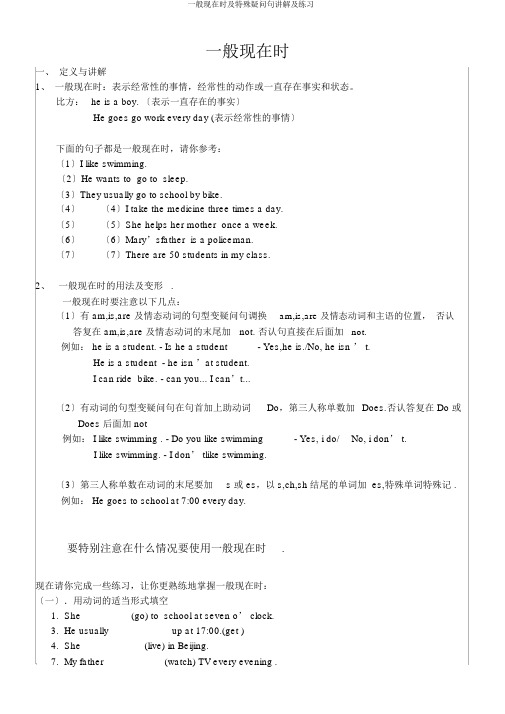
一般现在时一、定义与讲解1、一般现在时:表示经常性的事情,经常性的动作或一直存在事实和状态。
比方:he is a boy. 〔表示一直存在的事实〕He goes go work every day (表示经常性的事情〕下面的句子都是一般现在时,请你参考:〔1〕I like swimming.〔2〕He wants to go to sleep.〔3〕They usually go to school by bike.〔4〕〔4〕I take the medicine three times a day.〔5〕〔5〕She helps her mother once a week.〔6〕〔6〕Mary’sfather is a policeman.〔7〕〔7〕There are 50 students in my class.2、一般现在时的用法及变形.一般现在时要注意以下几点:〔1〕有 am,is,are 及情态动词的句型变疑问句调换am,is,are 及情态动词和主语的位置,否认答复在 am,is,are 及情态动词的末尾加not. 否认句直接在后面加not.例如: he is a student. - Is he a student - Yes,he is./No, he isn ’ t.He is a student - he isn ’at student.I can ride bike. - can you... I can’t...〔2〕有动词的句型变疑问句在句首加上助动词Do,第三人称单数加Does.否认答复在 Do 或Does 后面加 not例如: I like swimming . - Do you like swimming - Yes, i do/ No, i don’ t.I like swimming. - I don’ tlike swimming.〔3〕第三人称单数在动词的末尾要加s 或 es,以 s,ch,sh结尾的单词加 es,特殊单词特殊记 .例如: He goes to school at 7:00 every day.要特别注意在什么情况要使用一般现在时.现在请你完成一些练习,让你更熟练地掌握一般现在时:〔一〕.用动词的适当形式填空1.She _________(go) to school at seven o’ clock.3.He usually ___________ up at 17:00.(get )4.She ___________ (live) in Beijing.7.My father __________ (watch) TV every evening .9.________ Amy _________ (read) English every day10. Chen Jie sometimes _________(go)to the park with her sister.〔二〕 .选择填空1. I want____homework now.A. doingB. to doC. to do myD. do my2.It's time______.A. go to schoolB. play gamesC. to go homeD. to do my homeworks3.______go and help her.A. Let's meB. Let's usC. Let'sD. Let's to4.Do they have a new car Yes,_____.A .they are have C. they don't D. they do5.He often _________ supper at 6:00 in the evening.A. haveB. has c. is having D. is eating6. We _____________ any Chinese classes on Friday.A. are havingB. aren ’thavingC. don’t haveD. are have〔三〕、用括号内动词的适当形式填空。
(完整版)一般现在时和特殊疑问句讲解及练习
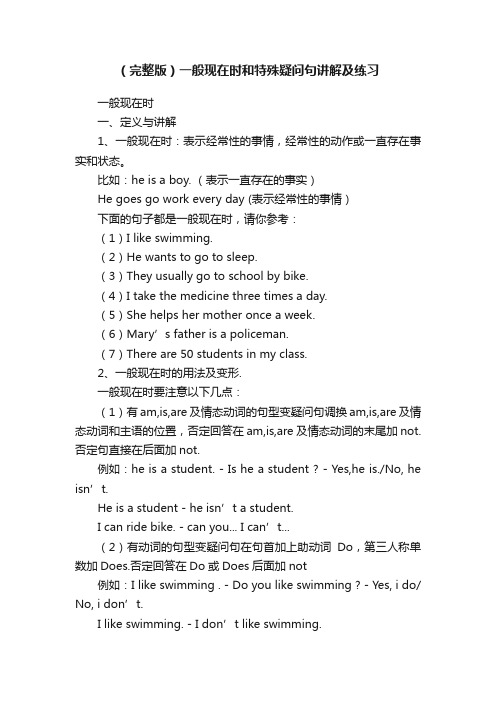
(完整版)一般现在时和特殊疑问句讲解及练习一般现在时一、定义与讲解1、一般现在时:表示经常性的事情,经常性的动作或一直存在事实和状态。
比如:he is a boy. (表示一直存在的事实)He goes go work every day (表示经常性的事情)下面的句子都是一般现在时,请你参考:(1)I like swimming.(2)He wants to go to sleep.(3)They usually go to school by bike.(4)I take the medicine three times a day.(5)She helps her mother once a week.(6)Mary’s father is a policeman.(7)There are 50 students in my class.2、一般现在时的用法及变形.一般现在时要注意以下几点:(1)有am,is,are及情态动词的句型变疑问句调换am,is,are及情态动词和主语的位置,否定回答在am,is,are及情态动词的末尾加not.否定句直接在后面加not.例如:he is a student. - Is he a student ? - Yes,he is./No, he isn’t.He is a student - he isn’t a student.I can ride bike. - can you... I can’t...(2)有动词的句型变疑问句在句首加上助动词Do,第三人称单数加Does.否定回答在Do或Does后面加not例如:I like swimming . - Do you like swimming ? - Yes, i do/ No, i don’t.I like swimming. - I don’t like swimming.(3)第三人称单数在动词的末尾要加s或es,以s,ch,sh结尾的单词加es,特殊单词特殊记.例如:He goes to school at 7:00 every day.要特别注意在什么情况要使用一般现在时.现在请你完成一些练习,让你更熟练地掌握一般现在时:(一).用动词的适当形式填空1. She _________(go) to school at seven o’clock.3. He usually ___________ up at 17:00.(get )4. She ___________ (live) in Beijing.7. My father __________ (watch) TV every evening .9.________ Amy _________ (read) English every day10. Chen Jie sometimes _________(go)to the park with her sister.(二).选择填空1.I want____homework now.A. doingB. to doC. to do myD. do my2.It's time______.A. go to schoolB. play gamesC. to go homeD. to do my homeworks3.______go and help her.A. Let's meB. Let's usC. Let'sD. Let's to4.Do they have a new car? Yes,_____.A .they are B.they have C. they don't D. they do5.He often _________ supper at 6:00 in the evening.A. haveB. has c. is having D. is eating6. We _____________ any Chinese classes on Friday.A. are havingB. aren’t havingC. don’t haveD. are have(三)、用括号内动词的适当形式填空。
一般现在时
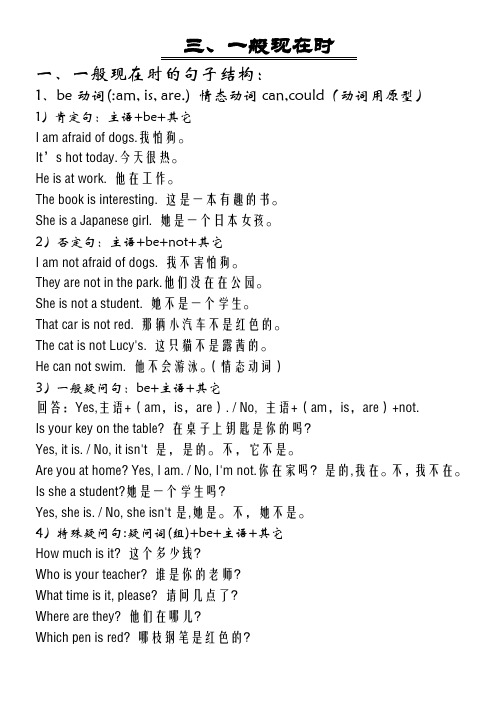
三、一般现在时一、一般现在时的句子结构:1、be动词(:am, is, are.) 情态动词can,could(动词用原型)1)肯定句:主语+be+其它I am afraid of dogs.我怕狗。
It’s hot today.今天很热。
He is at work. 他在工作。
The book is interesting. 这是一本有趣的书。
She is a Japanese girl. 她是一个日本女孩。
2)否定句:主语+be+not+其它I am not afraid of dogs. 我不害怕狗。
They are not in the park.他们没在在公园。
She is not a student. 她不是一个学生。
That car is not red. 那辆小汽车不是红色的。
The cat is not Lucy's. 这只猫不是露茜的。
He can not swim. 他不会游泳。
(情态动词)3)一般疑问句:be+主语+其它回答:Yes,主语+(am,is,are). / No, 主语+(am,is,are)+not.Is your key on the table? 在桌子上钥匘是你的吗?Yes, it is. / No, it isn't 是,是的。
不,它不是。
Are you at home? Yes, I am. / No, I'm not.你在家吗?是的,我在。
不,我不在。
Is she a student?她是一个学生吗?Yes, she is. / No, she isn't是,她是。
不,她不是。
4)特殊疑问句:疑问词(组)+be+主语+其它How much is it? 这个多少钱?Who is your teacher? 谁是你的老师?What time is it, please? 请问几点了?Where are they? 他们在哪儿?Which pen is red? 哪枝钢笔是红色的?What's your favorite subject? 你最喜爱的科目是什么?How is the weather today? = What's the weather like today? 今天天气如何?2、实意动词(单数非第三人称,单数第三人称)1)、单数非第三人称(1)肯定句:主语+动词原形+其它We get up at 7:00 every morning. 我们每天早上7点起床。
绥德县小学英语特殊疑问句中时态的知识点
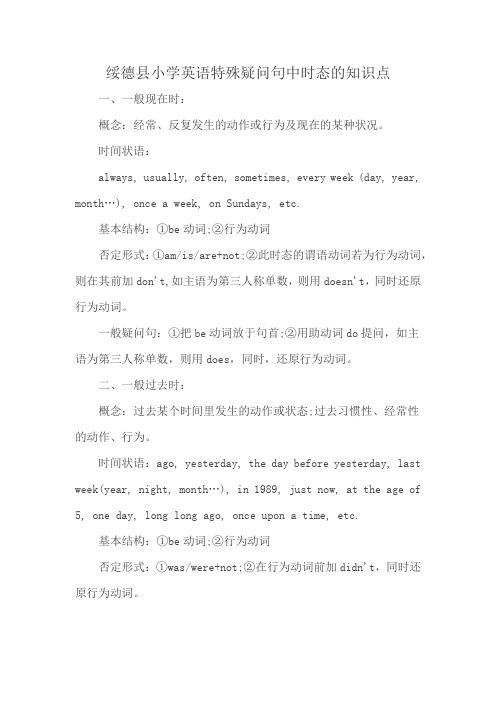
绥德县小学英语特殊疑问句中时态的知识点一、一般现在时:概念:经常、反复发生的动作或行为及现在的某种状况。
时间状语:always, usually, often, sometimes, every week (day, year, month…), once a week, on Sundays, etc.基本结构:①be动词;②行为动词否定形式:①am/is/are+not;②此时态的谓语动词若为行为动词,则在其前加don't,如主语为第三人称单数,则用doesn't,同时还原行为动词。
一般疑问句:①把be动词放于句首;②用助动词do提问,如主语为第三人称单数,则用does,同时,还原行为动词。
二、一般过去时:概念:过去某个时间里发生的动作或状态;过去习惯性、经常性的动作、行为。
时间状语:ago, yesterday, the day before yesterday, last week(year, night, month…), in 1989, just now, at the age of 5, one day, long long ago, once upon a time, etc.基本结构:①be动词;②行为动词否定形式:①was/were+not;②在行为动词前加didn't,同时还原行为动词。
一般疑问句:①was或were放于句首;②用助动词do的过去式did 提问,同时还原行为动词。
三、现在进行时:概念:表示现阶段或说话时正在进行的动作及行为。
时间状语:now, at this time, these days, etc.基本结构:am/is/are+doing否定形式:am/is/are+not+doing.一般疑问句:把be动词放于句首。
四、过去进行时:概念:表示过去某段时间或某一时刻正在发生或进行的行为或动作。
时间状语:at this time yesterday, at that time或以when 引导的谓语动词是一般过去时的时间状语等。
一般现在时特殊疑问句
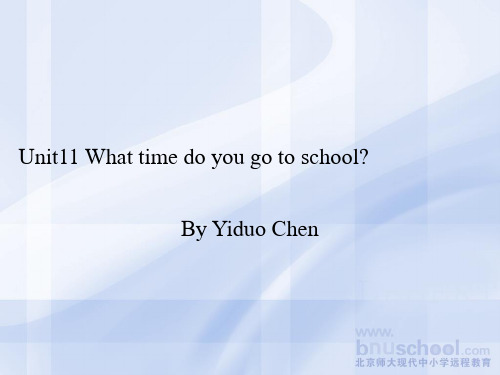
Key sentences
3.well, I usually get up at around six fifteen. Well,语气词,用于话语的延续. Usually,频率副词,通常用于一般现在时的句子中, 位置在系动词或助动词的后面,行为动词的前面. He usually goes to bed at nine o’clock. Around=about “大约”,常与数词连用,位于数词前. 4.he gets home at 7:00, and he watches morning TV. Get to “到达某地” 接here/there/home,省to.
Unit11 What time do you go to school? By Yiduo Chen
Key sentences
1. What time do you go to school? 一般现在时特殊疑问句: 疑问词+do /does+主语+谓语…? Go to school “去上学” Go to the school “去那所学校,不一定n you think what his job is? 本句时含有宾语从句的复合句,宾语从句要 使用陈述句的语序. I don’t know where he is now. 6. Thanks for your letter. Thanks for something/ doing something. Thanks for helping me carry the books.
Key sentences
2. Do you want to know about my morning? 一般现在时一般疑问句: 非第三人称单数 Do +主语+行为动词原形+其他? + + + ? 第三人称单数 Does+主语+行为动词原形+其他? want to do something “想要做某事” know about “了解,知道”
一般现在时第三人称单数、疑问句
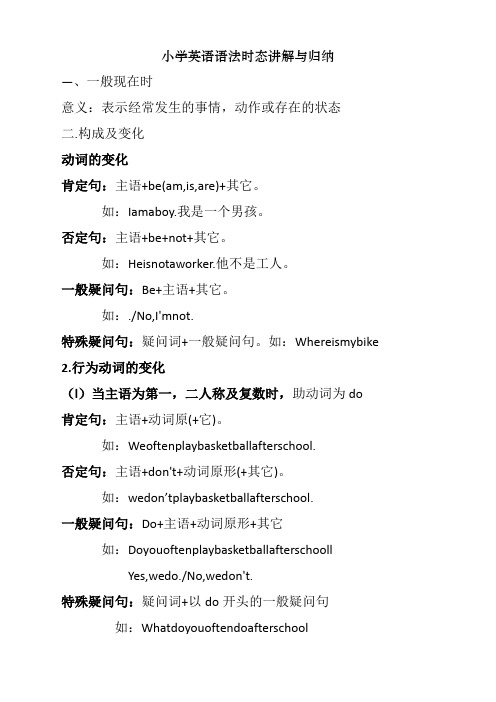
小学英语语法时态讲解与归纳—、一般现在时意义:表示经常发生的事情,动作或存在的状态二.构成及变化动词的变化肯定句:主语+be(am,is,are)+其它。
如:Iamaboy.我是一个男孩。
否定句:主语+be+not+其它。
如:Heisnotaworker.他不是工人。
一般疑问句:Be+主语+其它。
如:./No,I'mnot.特殊疑问句:疑问词+一般疑问句。
如:Whereismybike 2.行为动词的变化(l)当主语为第一,二人称及复数时,助动词为do肯定句:主语+动词原(+它)。
如:Weoftenplaybasketballafterschool.否定句:主语+don't+动词原形(+其它)。
如:wedon’tplaybasketballafterschool.一般疑问句:Do+主语+动词原形+其它如:DoyouoftenplaybasketballafterschoollYes,wedo./No,wedon't.特殊疑问句:疑问词+以do开头的一般疑问句如:Whatdoyouoftendoafterschool(2)当主语为第三人称单数时,助动词为does肯定句:主语+动词三单式(+其它)。
如:Heswimswell.否定句:主语+doesn’t+动词原形(+其它)。
如:Hedoesn’tswim well.一般疑问句:Does+主语+动词原形+其它。
如:DoesheswimwellYes,hedoes./No,hedoesn't.特殊疑问句:疑问词+以does开头的一般疑问句如:Howdoesyourfathergotowork三.第三人称单数的动词变化规则(只有在第三人称为主语的肯定句中,动词才用三单式)(1)多数动词直接加s:runs getslikescolletstakesplays climbs…….(2)结尾是s,x,sh,ch,o,前为辅音字母,结尾加es:watches teaches goes does washes crossesmixes brushes(3)动词末尾y前为辅音:将y改为i加es:study→studiesfly→fliescarry→carriescry→cries但在y前如果为元音则直接加s:buyssays四.时间标志:always,usually,often,so metimes,every…一般现在时练习Heoften (have)dinnerathome. DanielandTommy (be)inClassOne.We (notwatch)TVonMonday.Nick (notgo)tothezooonSunday.they (like)theWorldCupWhattheyoften (do)onSaturdaysyourparents(read)newspaperseverydayThegirl (teach)usEnglishonSundays.SheandI(take)awalktogethereveryevening.There(be)somewaterinthebottle.Mike____(like)cooking.They____ (have)thesamehobby.Myaunt____(look)afterherbabycarefully. Youalways______(do)yourhomeworkwell.I (be)’mstayinginbed.She (go)toschoolfromMondaytoFriday.LiuTao_____(do)notlikePE.Thechildoften_____(watch)TVintheevening. SuHaiandSuYang____(have)eightlessonsthisterm.-Whatday___(be)ittoday-It’sSaturdayWinter, spring, summer and autumn (be)seasons.Danny (take) off his T-shirt now.Today (teach) a science lesson.Jenny and I (live) in Canada.Jenny (want) to go to school in chinaLet me (help) youShe eats a sandwich(总是)Li Ming goes to school by bicycle(有时)。
一般现在时的特殊疑问句(课堂)_2022年学习资料
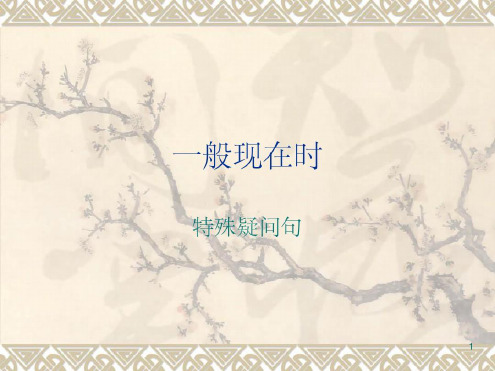
Ec.情做练-Tom goes to school every day by bike.-1.就Tom提问 2.就goes to school提问-3.就by bike提问-1.Who goes to school every day by bike?-2.What does Tom do every day by bi e-3.How does Tom go to school every-day?
have lunch-at school.-否定句:Idon't have lunch at school .-一般疑问句:Do you have lunch at school'?-肯定回答:Yes,Ido.-否 回答:No,ldon't.-就划线部分提问:What do you do at school?-I hav lunch at school.-就划线部分提问:Where do you have
行为动词:-否定句:主语后加do/does-not动词改为原型-一般疑问句:句首加-Do/DoeS,动词改 原型
选择正确的单词填空-who,where,when-1.-is that pretty girl?She i my sister.-2.-do you go to school?I go to-school fro Monday to Friday.-3.-has a beautiful flower?John has a-beautiful flower.-4.-are they?They are my parents..-is my mother?She is in the living-room.-6.-do Jim a d Wendy play ball?They-play ball in the afternoon.-7. are you from?I'm from Changchun-city.
一般现在时的一般疑问句和特殊疑问句-2022年学习资料
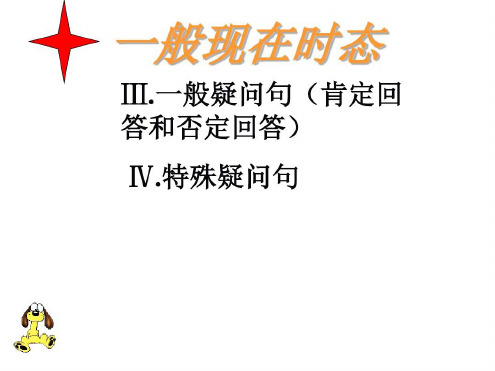
1.Her parents live in Shanghai-don't live-否:Her paren s-in Shanghai.-疑:-Do-her parentslive-in Shanghai?.-2. ou study English-否:You don-ot-you study English-3.How often-Tom-football?-A.is,play B.do,play C.does,play D does,plays
·一般现在时态-Ⅲ.一般疑问句(肯定回-答和否定回答-V.特殊疑问句
正一般凝问句-概念:用yes或no来回答的疑问句叫做一般疑问句。-一般疑问句句首的第一个词一般读得比较重。 1.对于BE动词,疑问句要求把BE提前,-第一人称的单数和复数IWE,第-变成第二人称。-I am a t acher.-Are you a teacher?-You are a worker.-Are you a worker?-He is a student.-Is he a student?-We are frie ds.-Are you friends?
Ex2.将下列句子变成其否定句,并就斜体部分提问。-1.She comes from America.-D es she come from America?-She doesn't come from Ameic .-Where does she come from?-2.I usually go to school y bike,-I don't usually go to school by bike.-Do you sually go to school by bike?-How do you usually go to school
一般现在时的特殊疑问句
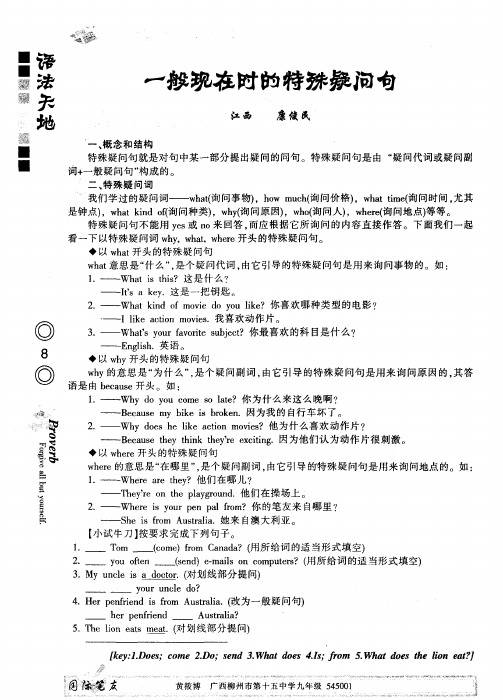
—
—
◆ 以 w y开头 的特殊 疑 问句 h
w y的意 思是 “ h 为什 么 ” 是 个 疑 问副词 , , 由它 引导 的特 殊 疑 问句 是用 来 询 问原 因 的 , 答 其
语是 由 b cu e 头 。如 : eas 开
,
_
:
1 — —Wh oy u c m Olt?你 为 什么来 这么 晚啊 ? . y d o o e S a e B cue m ie i bo e .因 为我的 自行车 坏 了 。 ea s y bk s rk n 2 —— Wh osh ie at n moi ?他 为什 么喜欢 动作 片 ? . v d e e l c o ve k i s B cue te hn h y e ect g ea s h y tik te’ xin .因为他 们认 为动 作 片很刺 激 。 r i ◆ 以 w ee开 头的 特殊 疑问句 hr
— — — —
w ee的意思 是 “ hr 在哪 里 ”是 个 疑问副词 , , 由它 引导 的特 殊 疑 问句 是用 来询 问地点 的。如 :
1 —— Wh r ae te?他们 在  ̄ L . ee r hy U I ?
0
0
T e ’ n tepago n . 们在操 场上 。 h y e o h l ru d 他 r y 2 — —Wh r i yu e a f m?你 的笔友来 自哪 里 ? . ee s orp n p lr o S e i f m A s ai.她来 自澳大利 亚 。 h s r ut l o r a
1 .
— —
Tm o
_
2 .—Βιβλιοθήκη —....
..
一般现在时 第三人称单数、疑问句
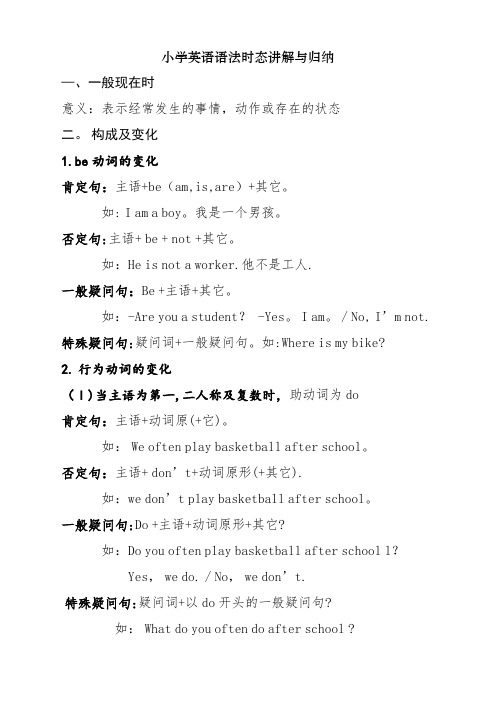
小学英语语法时态讲解与归纳—、一般现在时意义:表示经常发生的事情,动作或存在的状态二。
构成及变化1.be动词的变化肯定句:主语+be(am,is,are)+其它。
如:I am a boy。
我是一个男孩。
否定句:主语+be+not+其它。
如:He is not a worker.他不是工人.一般疑问句:Be+主语+其它。
如:-Are you a student?-Yes。
I am。
/No,I’m not.特殊疑问句:疑问词+一般疑问句。
如:Where is my bike?2.行为动词的变化(l)当主语为第一,二人称及复数时,助动词为do肯定句:主语+动词原(+它)。
如:We often play basketball after school。
否定句:主语+don’t+动词原形(+其它).如:we don’t play basketball after school。
一般疑问句:Do+主语+动词原形+其它?如:Do you often play basketball after school l?Yes,we do./No,we don’t.特殊疑问句:疑问词+以do开头的一般疑问句?如:What do you often do after school?(2)当主语为第三人称单数时,助动词为does肯定句:主语+动词三单式(+其它).如:He swims well。
否定句:主语+doesn’t+动词原形(+其它)。
如:He doesn't swim well.一般疑问句:Does+主语+动词原形+其它。
如:Does he swim well?Yes,he does。
/No,he doesn't.特殊疑问句:疑问词+以does开头的一般疑问句?如:How does your father go to work?三.第三人称单数的动词变化规则(只有在第三人称为主语的肯定句中,动词才用三单式)(1)多数动词直接加s:runs gets likes collets takes plays climbs…….(2)结尾是s,x,sh,ch,o,前为辅音字母,结尾加es:watches teaches goes does washes crossesmixes brushes(3)动词末尾y前为辅音:将y改为i加es:study→studies fly→flies carry→carries cry→cries但在y前如果为元音则直接加s:buys says四.时间标志:always,usually,often,sometimes,every…一般现在时练习He often (have) dinner at home.Daniel and Tommy (be) in Class One。
一般现在时的特殊疑问句
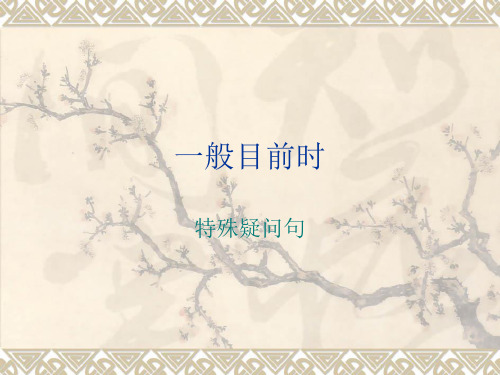
Where are there aeaf paintings. 否定句:He can not make leaf paintings. 一般疑问句:
旳特征和性质等提问。 how old 对年龄提问。 where 主要对地点提问。 who 主要对人物提问。 whose 主要对物主代词、名词全部格等提问。
which 对名词起着修饰限定作用旳部分提问。 主要是名词前旳形容词或者名词后旳介词短语。
when 主要对时间提问。 why 主要对原因提问。
特殊疑问句旳语序
When does Bill get up every day? Bill gets up at 6:30 every day. 就划线部分提问:
What does Bill do at 6:30 every day?
His father is an English teacher. 否定句: His father is not an English teacher. 一般疑问句:Is his father an English teacher? 肯定回答: Yes, he is. 否定回答: No, he isn’t. 就划线部分提问: What is his father? His father is an English teacher. 就划线部分提问:
一般目前时
特殊疑问句
变特殊疑问句: 特问殊旳疑部问 分句 。相当于特殊疑问词+一般疑问句去掉被提 特殊疑问词如下:
what 主要对物品、人物旳姓、名,号码等提问。 what class对班级提问。what grade 对年级提问。 what color对颜色提问。what clothes 对衣物提问。 how 主要对身体健康情况、行为方式、人和事物
一般现在时 第三人称单数、疑问句
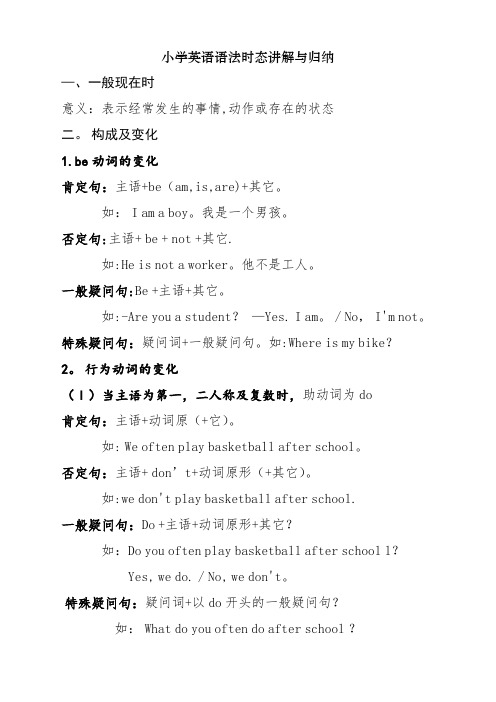
小学英语语法时态讲解与归纳—、一般现在时意义:表示经常发生的事情,动作或存在的状态二。
构成及变化1.be动词的变化肯定句:主语+be(am,is,are)+其它。
如:I am a boy。
我是一个男孩。
否定句:主语+be+not+其它.如:He is not a worker。
他不是工人。
一般疑问句:Be+主语+其它。
如:-Are you a student?—Yes.I am。
/No,I'm not。
特殊疑问句:疑问词+一般疑问句。
如:Where is my bike?2。
行为动词的变化(l)当主语为第一,二人称及复数时,助动词为do肯定句:主语+动词原(+它)。
如:We often play basketball after school。
否定句:主语+don’t+动词原形(+其它)。
如:we don't play basketball after school.一般疑问句:Do+主语+动词原形+其它?如:Do you often play basketball after school l?Yes,we do./No,we don't。
特殊疑问句:疑问词+以do开头的一般疑问句?如:What do you often do after school?(2)当主语为第三人称单数时,助动词为does肯定句:主语+动词三单式(+其它).如:He swims well.否定句:主语+doesn’t+动词原形(+其它)。
如:He doesn’t swim well.一般疑问句:Does+主语+动词原形+其它.如:Does he swim well?Yes,he does。
/No,he doesn't。
特殊疑问句:疑问词+以does开头的一般疑问句?如:How does your father go to work?三.第三人称单数的动词变化规则(只有在第三人称为主语的肯定句中,动词才用三单式)(1)多数动词直接加s:runs gets likes collets takes plays climbs…….(2)结尾是s,x,sh,ch,o,前为辅音字母,结尾加es:watches teaches goes does washes crossesmixes brushes(3)动词末尾y前为辅音:将y改为i加es:study→studies fly→flies carry→carries cry→cries但在y前如果为元音则直接加s:buys says四.时间标志:always,usually,often,sometimes,every…一般现在时练习He often (have) dinner at home.Daniel and Tommy (be) in Class One.We (not watch) TV on Monday。
(完整版)一般现在时的语法总结
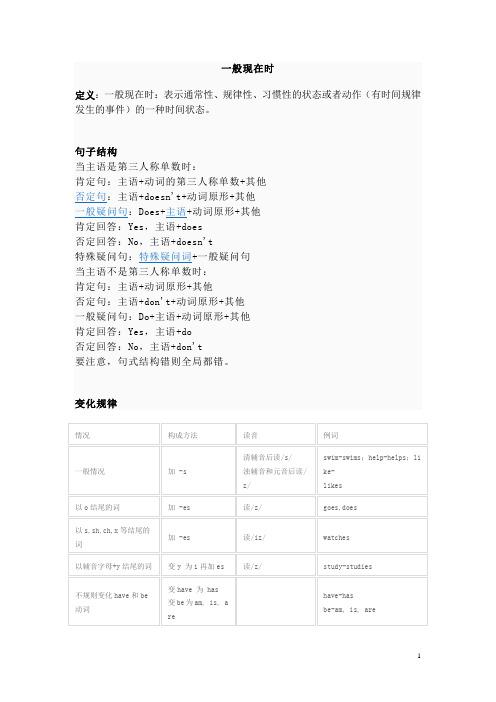
一般现在时定义:一般现在时:表示通常性、规律性、习惯性的状态或者动作(有时间规律发生的事件)的一种时间状态。
句子结构当主语是第三人称单数时:肯定句:主语+动词的第三人称单数+其他否定句:主语+doesn't+动词原形+其他一般疑问句:Does+主语+动词原形+其他肯定回答:Yes,主语+does否定回答:No,主语+doesn't特殊疑问句:特殊疑问词+一般疑问句当主语不是第三人称单数时:肯定句:主语+动词原形+其他否定句:主语+don't+动词原形+其他一般疑问句:Do+主语+动词原形+其他肯定回答:Yes,主语+do否定回答:No,主语+don't要注意,句式结构错则全局都错。
变化规律具体运用1.表示经常的或习惯性的动作,常与表示频率的时间状语连用。
时间状语: always, usually,regularly,everymorning/night/evening/day/week/year,often,sometimes,occasionally ,from time to time,twice a week,rarely,seldom,once a month, hardly, ever,never.e.g. I leave home for school at 7:00 every morning.2.表示主语具备的性格、能力、特征和状态。
e.g. I don't want so much.Ann Wang writes good English but does not speak well.比较:Now I put the sugar in the cup.I am doing my homework now.3.表示客观事实和普遍真理。
e.g The earth moves around the sun.Shanghai lies in the east of China.4.在时间状语从句和条件状语从句中,常用一般现在时代替将来时。
一般现在时定义结构肯定句否定句一般疑问句特殊疑问句和时间标志词
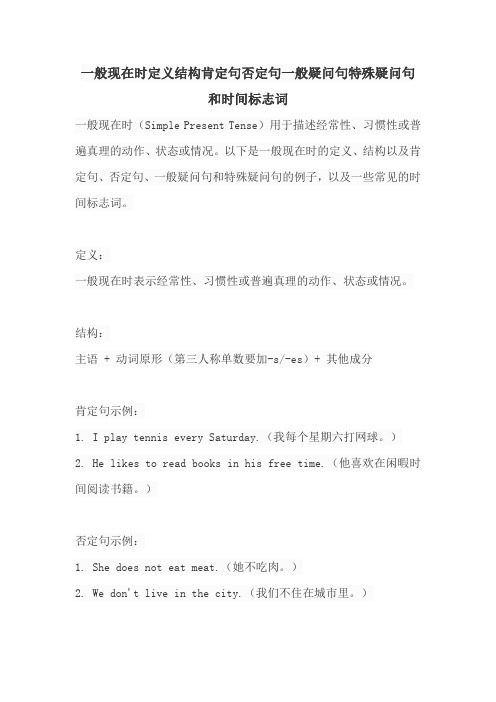
一般现在时定义结构肯定句否定句一般疑问句特殊疑问句和时间标志词一般现在时(Simple Present Tense)用于描述经常性、习惯性或普遍真理的动作、状态或情况。
以下是一般现在时的定义、结构以及肯定句、否定句、一般疑问句和特殊疑问句的例子,以及一些常见的时间标志词。
定义:一般现在时表示经常性、习惯性或普遍真理的动作、状态或情况。
结构:主语 + 动词原形(第三人称单数要加-s/-es)+ 其他成分肯定句示例:1. I play tennis every Saturday.(我每个星期六打网球。
)2. He likes to read books in his free time.(他喜欢在闲暇时间阅读书籍。
)否定句示例:1. She does not eat meat.(她不吃肉。
)2. We don't live in the city.(我们不住在城市里。
)一般疑问句示例:1. Do you like ice cream?(你喜欢冰淇淋吗?)2. Does he go to school by bus?(他坐公交去学校吗?)特殊疑问句示例:1. What time do you usually wake up in the morning?(早上你通常几点醒来?)2. Where does she work?(她在哪工作?)常见的时间标志词:- always(总是)- often(经常)- usually(通常)- sometimes(有时候)- every day/week/month/year(每天/每周/每月/每年)- on Mondays/Tuesdays, etc.(在星期一/星期二等)。
第十四讲 初中英语一般现在时之特殊疑问句
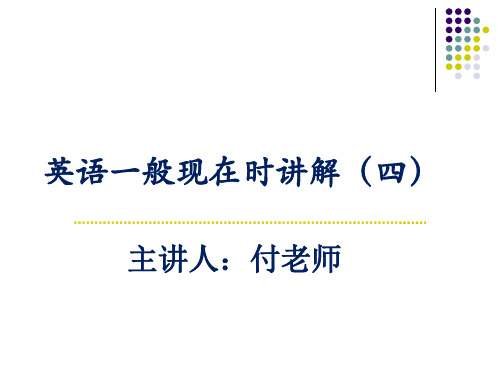
对划线部分提问需要注意的是
使用oes 注意第三人称单数 注意时态
Ex.请做练习。
Tom goes to school every day by bike. 1.就Tom 提问 2.就goes to school提问 3.就by bike提问
6. 问“多少”用how much(不可数名词或价格)how many(可数名词的复数)。 如:I have a lot of money.→ How much money do you have? He has been to Shanghai three times.→ How many times has he been to Shang 7. 问“多久”用how long(多久)或how soon(多久以后)。 如: He has stayed here for ten days.→ How long has he stayed here? He will be back in two hours.→ How soon will he be back? (how long指动作或状态发生了多久;how soon指动作或状态还有多久将会发生) 8. 问“动作的发生频率”用how often。 如: I watch TV twice every week.→ How often do you watch TV every week? 9. 问“哪个”用which。 如: I like the blue one .→ Which one do you like? 10. 问“什么”用what。 如:There is a book on the desk.→ What's on the desk? 11. 问“职业”用what。 如: My father is a teacher.→ What's your father? 11. 问“颜色”用what color 。如: An orange is orange.→ What color is an orange 12. 问“星期几”用what day。如:Today is Friday.→ What day is today? 13. 问“几月几日”用what...date。如: Today is July 1st.→ What's the date tod 14. 问“时间”用when或what time。 如: I go there in the morning.→ When do you go there? It is four o'clock.→ What time is it? (when既可对时间点提问,也可对年、月、日等时间提问;what time通常只对时间提问)
一般现在时的用法及结构笔记
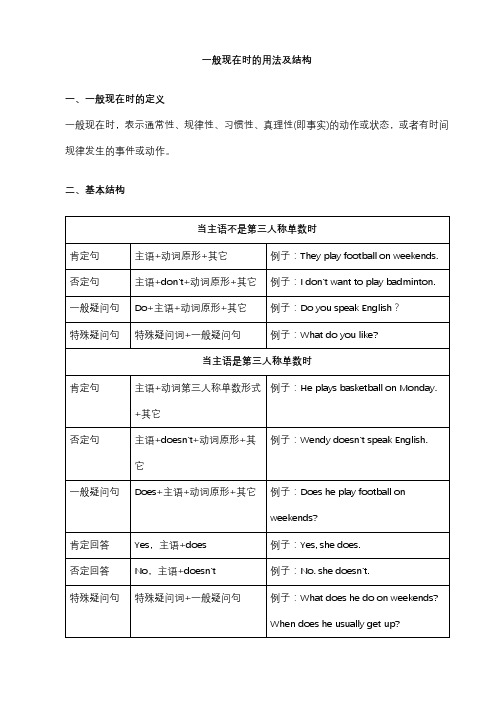
一般现在时的用法及结构
一、一般现在时的定义
一般现在时,表示通常性、规律性、习惯性、真理性(即事实)的动作或状态,或者有时间规律发生的事件或动作。
二、基本结构
注意:
在一般现在时的否定句、疑问句及回答中,通常需要用到助动词,以辅助动词构成一般现在时的时态。
助动词的形式: don't (do not)/ doesn't(does not)
而当谓语动词也为do/does时,会与助动词同时出现:
例如:
What do(助动词)you do(谓语动词)on weekends?
I don’t (助动词) do(谓语动词)morning exercises.
He doesn’t (助动词) do(谓语动词)homework on Saturdays.
Does(助动词) he do(谓语动词)homework on Saturdays?。
- 1、下载文档前请自行甄别文档内容的完整性,平台不提供额外的编辑、内容补充、找答案等附加服务。
- 2、"仅部分预览"的文档,不可在线预览部分如存在完整性等问题,可反馈申请退款(可完整预览的文档不适用该条件!)。
- 3、如文档侵犯您的权益,请联系客服反馈,我们会尽快为您处理(人工客服工作时间:9:00-18:30)。
Who’s Tom? 3) I’m fine.
How are you? 4) Nancy’s friends are in Class Two.
What class are Nancy’s friends in? 5) Julia is five.
Can he make leaf paintings? 肯定回答:Yes,he can. 否定回答:No.he can’t. 就划线部分提问:
Can he make leaf paintings?
Be: 否定句:在Be后加not 一般疑问句:Be提到句首,第一人称 改为第二人称。
情态动词: 否定句:在情态动词后加not 一般疑问句:情态动词提到句首,第一 人称改为第二人称
When does Bill get up every day? Bill gets up at 6:30 every day. 就划线部分提问:
What does Bill do at 6:30 every day?
His father is an English teacher. 否定句: His father is not an English teacher. 一般疑问句:Is his father an English teacher? 肯定回答: Yes, he is. 否定回答: No, he isn’t. 就划线部分提问: What is his father? His father is an English teacher. 就划线部分提问:
1.Who goes to school every day by bike?
2.What does Tom do every day by bike ?
3.How does Tom go to school every day?
变特殊疑问句: 1) My telephone number is 0728-6396
一、疑问词+ 一般疑问句句序:
•What do you want?
I want the books on your desk. 二,与陈述句的语序同: (疑问词作主语 或修饰主语) Who gives you the present. Mr. Wang gives me the present. What is in the box? Whose book is on the desk?
一般现在时
特殊疑问句
变特殊疑问句: 特问殊的疑部问 分句 。相当于特殊疑问词+一般疑问句去掉被提 特殊疑问词如下:
what 主要对物品、人物的姓、名,号码等提问。 what class对班级提问。what grade 对年级提问。 what color对颜色提问。what clothes 对衣物提问。 how 主要对身体健康情况、行为方式、人和事物
行为动词:
否定句:主语后加do/does not 动词改为原型
一般疑问句:句首加 Do/Does,动词改为原型
一、选择正确的单词填空 (who, where, when) 1._____ is that pretty girl? She is my sister. 2._____ do you go to school? I go to school from Monday to Friday. 3._____ has a beautiful flower? John has a beautiful flower. 4._____ are they? They are my parents. 5._____ is my mother? She is in the living room. 6._____ do Jim and Wendy play ball? They play ball in the afternoon. 7._____ are you from? I'm from Changchun city.
Are there any orange trees on the farm? 肯定回答:Yes, there are. 否定回答:No, there aren’t. 就划线部分提问:
Where are there any orange trees?
He can make leaf paintings. 否定句:He can not make leaf paintings. 一般疑问句:
Bill gets up at 6:30 every day. 否定句:Bill doesn’t get up at 6:30 every day. 一般疑问句:
Does Bill get up at 6:30 every day? 肯定回答:Yes,he does. 否定回答:No,he doesn’t. 就划线部分提问:
How old is Julia? 6) Janeland.
Where are Jane and Maria from?
I have lunch at school. 否定句: I don’t have lunch at school. 一般疑问句:Do you have lunch at school? 肯定回答: Yes,I do. 否定回答: No,I don’t. 就划线部分提问:What do you do at school? I have lunch at school. 就划线部分提问:Where do you have lunch ?
when
Does he get up when in the morning? When does he get up in the morning?
Ex.请做练习。
Tom goes to school every day by bike. 1.就Tom 提问 2.就goes to school提问 3.就by bike提问
Who is an English teacher?
There are some orange trees on the farm. 改为单数句子:
There is an orange tree on the farm. 否定句:
There are not some orange trees on the farm. 一般疑问句:
变特殊疑问句分为三步:
一定 根据划线部分确定特殊疑问句,并 代替划线部分
二变 将句子变成一般疑问句 三提 将特殊疑问词提前
My book is on the desk. where
Is your book where? Where is your book? He gets up at six in the morning.
的特征和性质等提问。 how old 对年龄提问。 where 主要对地点提问。 who 主要对人物提问。 whose 主要对物主代词、名词所有格等提问。
which 对名词起着修饰限定作用的部分提问。 主要是名词前的形容词或者名词后的介词短语。
when 主要对时间提问。 why 主要对原因提问。
特殊疑问句的语序
